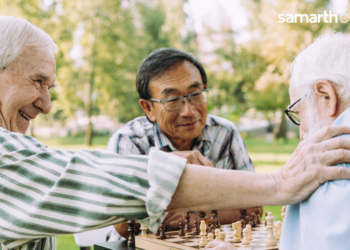Do you know the secret to a longer life? We are not talking about exercising or medications or yoga. Research suggests that for older adults, strong friendships have a larger impact on longevity than daily exercise. In light of this, it is wonderful to see that 59.3% of our community members confirm that friendships are of paramount importance for their overall well-being.
Going for a walk with your friends, playing chess, taking a yoga class together or even having a conversation over coffee as an older adult has many benefits – just ask the 70% of Samarth Community seniors who attested that spending time with their friends has positively affected their lives. So, what are the benefits that friendships bring? Read on to find out!

Join Now >
BENEFITS OF FRIENDSHIP ON THE QUALITY OF LIFE AMONG OLDER ADULTS:
Our Samarth seniors feel that friendships have positively affected their lives by increasing overall happiness (70.4%), providing emotional support (59.3%), creating opportunities to pursue common interests (59.3%), enhancing social connections (51.9%), reducing feelings of loneliness (51.9%) and providing a sense of belonging (37%).
FRIENDSHIPS PROVIDE SOCIAL SUPPORT
SUPPORT DURING TRANSITIONS: As we get older, our friends become increasingly significant for our health and well-being. Friends provide support ranging from encouraging healthy habits to emotional and even financial support during difficult times. A study published in PubMed Central indicates that social support and positive social relationships have beneficial impacts on mental and physical health among seniors. Also, a larger social network with friends is associated with greater life satisfaction.
Knowing that we have the support of our friends during a difficult setback combats feelings of loneliness and isolation among seniors. In-person interactions are essential to develop resilience, especially in hard times.
COMBATING ISOLATION AND LONELINESS: Friendships also help us stay positive in our senior years. For people of every age group, mental, physical, and general well-being depends on relationships with their friends. According to our survey of Samarth seniors, lack of close friends negatively affected seniors’ life by resulting in increased feelings of loneliness, decreased social engagement, reduced emotional support and belonging. Conversely, the care, support, and connection our friends provide reduces stress and the risk of depression, especially among seniors.
FRIENDSHIPS ENHANCE YOUR EMOTIONAL WELL BEING
SHARING WISDOM AND EXPERIENCES: It is interesting to note that 81.4% of our seniors have friends that are either older or younger than them. Most of them feel that intergenerational friendships have many benefits ranging from positive discussions, different opinions on topics, providing guidance to youngsters, getting to know different paradigms of life and learning through the experiences of older friends.
SENSE OF PURPOSE AND BELONGING: It is crucial to maintain friendships as they instill a sense of purpose and value. Major life changes like retirement and declining physical health can lead to feelings of isolation, loneliness, and a lack of purpose. However, maintaining and cultivating friendships can help mitigate these negative effects and provide older adults with a sense of belonging and purpose. Seniors who have a sense of purpose are more likely to live longer and are less prone to cognitive decline, heart attacks, and strokes. They take better care of themselves, are more physically active, and are also less sensitive to stress.
A 75-year-long study by Harvard University highlighted the value of having a life full of close interactions with family and friends. People who had harmonious connections in their social circles, whether with family or friends, were happier and lived longer. A small group of close friends are crucial for happiness and well-being. According to our survey, 29.6% of our Samarth seniors have 3 or fewer close friends, 44.4% have 4-6 close friends and 25.9% have more than 6 close friends.
FRIENDSHIPS ARE IMPORTANT FOR YOUR COGNITIVE STIMULATION
IMPROVED COGNITIVE SKILLS: Participating in leisure activities with friends as you age can help improve cognitive skills like memory and executive functioning. Our Samarth survey revealed that 81.5% of our seniors have noticed that engaging in activities and conversing with friends has kept their minds sharp.
Here are some suggestions from the community for older adults to improve their cognitive abilities: engaging in intellectual discussions or debates, solving puzzles or brain teasers together, reading and discussing books or articles, playing board games or card games, taking part in educational classes together, or going on senior-friendly trips.
85.2% of our seniors feel that friendship is important for your overall well-being. Having close bonds with people can directly affect your lifespan by reducing the risks that come along with loneliness, lack of social support, and cognitive decline.
NOW WHAT?
Seniors should actively put in efforts to stay in touch and nurture their existing friendships as well as go out to make new friends. Our survey reveals that 29.6% of our seniors make new friends regularly, 44.4 % of them prefer to focus on their existing relationships and 12% are looking to make new friends.
MAINTAINING FRIENDSHIPS AS AN OLDER ADULT:
How can one nurture existing friendships?
Our Samarth seniors revealed that regular communication (55.6%) was the most important factor for them to nurture their existing relationships, followed by being there in times of need (25.9%) and mutual trust (14.8%). Older adults who have strong social ties are less likely to experience serious health issues like depression and hypertension, and they tend to live longer.
Research suggests that seniors should spend social time with friends three times a week. According to our survey, 58% of Samarth seniors spend less than this much time with their friends, and 25.9% interact with their friends only about once a month.
MAKING NEW FRIENDS AS AN OLDER ADULT
Our survey revealed that 40.7% of our seniors do not face any barriers when it comes to making new friends. However, the remaining seniors have many hurdles to making new friends: 29.6% find it hard to keep in touch with new people, 11.1% have limited mobility and transportation options, 3.7% struggle to find people with shared interests and 7.4% of our seniors feel that they lack opportunities to meet new people.
How can one make new friends as an older adult?
Making and keeping friends as we become older is essential for survival. Friends not only lengthen lifespan but also reduce loneliness, a risk factor for functional decline and death in those 60 years and older.
Seniors can volunteer, join a reading club, take control of the digital world, mentor kids, join a kirtan, take an art class, sign up for senior-friendly exercises to create new friendships. Being more involved in their community or society events is a way through which seniors can make new friends. Another way through which seniors can actively interact and make new friends is by being part of a senior citizens community, like Samarth. In many ways, friends are like family, and research has proven that friendship increases happiness, lengthens life, and promotes both physical and mental health. Friendship eases stress and despair, provides comfort while we are struggling, and gives our days purpose. Our survey also revealed that our members felt the positive effects of friendships in their lives.
It is never too late to make new friends or rekindle connections with old friends. Make it a part of your routine to take time out to connect with friends and put in the effort to nurture your relationships starting today!









